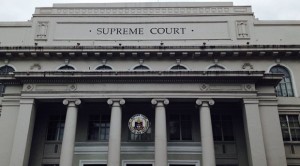SC: Neither Cory nor Noynoy Aquino banned Marcos burial at LNMB
Corazon Aquino and Benigno “Noynoy” Aquino III, both former presidents, failed to enact a law specifically disqualifying Ferdinand Marcos from being buried at the Libingan ng mga Bayani (LNMB), though both of them were “aggrieved” by martial law, the Supreme Court said.
In its 58-page decision, the high court, through Associate Justice Diosdado Peralta Jr., said Republic Act 10368, or the Human Rights Victims Reparation and Recognition of 2013, has no specific provision that prohibits the burial of Marcos at the heroes’ cemetery.
RA 10368, which was signed into law by then President Benigno Aquino III in 2013, provides for the compensation of human rights victims of the dictatorship. When he signed it into law, Aquino said the law was aimed at correcting the wrongs of the past.
The petitioners who sought a Supreme Court ruling to stop the Marcos burial argued that the beneficial provisions of that law are not exclusive as it includes the prohibition against the former dictator’s interment at LNMB.
But the high court said: “It would be undue to extend the law beyond what it actually contemplates. With its victim-oriented perspective, our legislators could have easily inserted a provision specifically proscribing Marcos’ interment at the LNMB as a ‘reparation’ for the human rights victims, but they did not.”
“As it is, the law is silent and should remain to be so. This Court cannot read into the law what is simply not there. It is irregular,” the high court said.
Without any law, only the Armed Forces of the Philippines (AFP) Regulations could serve as the sole authority in determining who are entitled to and disqualified from burial at the LNMB.
The first AFP Regulations were issued in 1960, which specified who could be interred at the LNMB, which included World War II dead of the AFP and recognized guerillas, AFP members, retired military personnel, former AFP members who had been interred at different cemeteries, and others upon approval of Congress, the president, or the secretary of national defense.
The regulations were amended in 1973 to include veterans who died during the revolution of 1896 or during Word War I.
The amended regulations also state that the spouse of active or retired or deceased military personnel, recognized guerillas, and discharged military personnel for cause or who joined the enemy are not allowed to be buried at LNMB.
Then, in 1986, then Gen. Fidel Ramos, then AFP chief, amended the regulations to include Medal of Valor awardees, presidents or commander-in-chiefs, ministers or secretaries of national defense, general/flag officers of the AFP, government dignitaries, statesmen, national artists, and others upon approval by the president or the Batasan Pambansa.
In 1998, the regulations were again amended to include widows of former presidents, secretaries of national defense and AFP chiefs. Those not allowed include personnel who were dishonorably separated, reverted, or discharged from the service and otherwise qualified personnel who had been convicted by final judgment of an offense involving moral turpitude.
The regulations were last amended in 2000.
“In the absence of any executive issuance or law to the contrary, the AFP Regulations remains to be the sole authority in determining who are entitled and disqualified to be interred at the LNMB,” the Supreme Court ruling said.
The high court also noted that the petitioners did not dispute that Marcos was a former president and commander-in-chief, a legislator, secretary of national defense, and a veteran who was also a Medal of Valor awardee.
“For his alleged human rights abuses and corrupt practices, we may disregard Marcos as a president and commander-in-chief, but we cannot deny him the right to be acknowledged based on the other positions he held or the awards he received,” the high court said. “In this sense, we agree with the proposition that Marcos should be viewed and judged in his totality as a person. While he was not all good, he was not pure evil either. Certainly, just a human who erred like us.”
Nine Justices voted to dismiss the petitions against the Marcos burial while five dissented, with one abstaining. /atm















